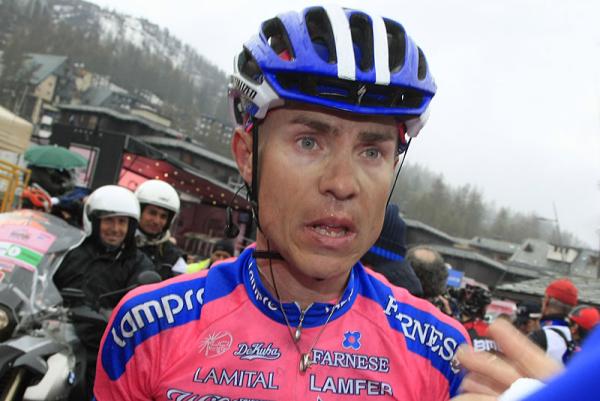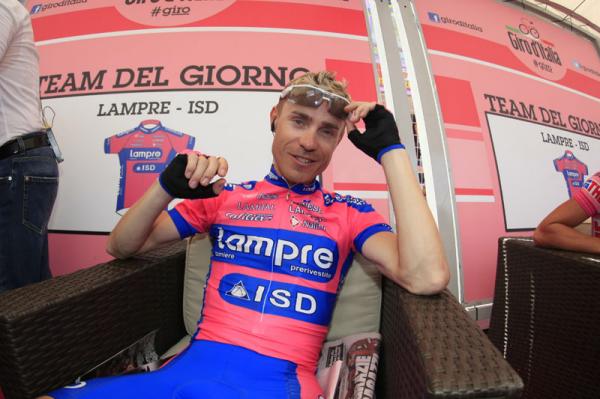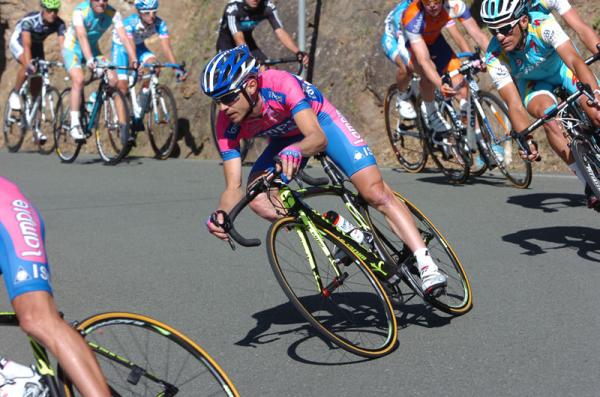Cunego’s illusion fades on road to Cervinia
Hesjedal must not be underestimated warns Scarponi



Damiano Cunego (Lampre-ISD) briefly threatened to open up the fight for the pink jersey on stage 14 of the Giro d’Italia when he jumped clear of the group of favourites on the Col de Joux with 48km still to race, but his effort petered out on the final climb to Cervinia. While he ultimately conceded a minute to the main overall contenders, his teammate Michele Scarponi was at the heart of the tense, tactical battle in the finale.
In keeping with the tenor of the race to date, Cunego’s audacious move was in fact born out of caution. When José Rujano (Androni-Venezuela) careered away 3 kilometres from the summit of the Col de Joux, Cunego was smartly across to his wheel to police the break, but little did he realise that the Venezuelan was simply attacking in order to avoid losing ground on the treacherous descent that followed.
“I followed Rujano because I thought he might try and make a dangerous action, but once I went over the top, I found myself alone after practically two bends,” Cunego said on crossing the line. “I didn’t really know what to do, but I knew that being out there would be an additional worry for our rivals and I think that they had to pull very hard to bring us back.”
As Cunego chugged clear of the group of favourites, one was briefly reminded of the lengthy solo raid to Falzes eight years ago that gave him both the maglia rosa and the upper hand in the bitter internal struggle with Gilberto Simoni for leadership of Saeco. Cunego’s advantage never stretched beyond a minute on this occasion, however, and he insisted that his attack was for the collective good rather than any attempt to mark his territory.
“We tried to light the race up a bit,” Cunego said. “We needed to do it, because we needed to wear out the others a bit before the final climb.
Scarponi agreed with his teammate’s version of events, noting that Cunego’s attack was designed to try and upset the catenaccio tactics of Liquigas-Cannondale, who spent the day looking to discourage any aggressive changes in rhythm. Ivan Basso’s men have approached the Giro almost like a two-legged football match, looking to keep a clean sheet in the opening two weeks before eking out the win on “home” terrain in the Dolomites in the race’s closing days.
“Liquigas made the race at a decent pace,” Scarponi said. “But at Lampre we rode well too, especially with Damiano looking to anticipate on the penultimate climb and put our rivals under a bit of pressure.”
The latest race content, interviews, features, reviews and expert buying guides, direct to your inbox!
Cunego’s sortie ground to a halt on the long haul to Cervinia, with all of 16 kilometres still to race, and he was distanced when the ties binding the group of favourites began to loosen nearer the summit, rolling across the line 1:40 down on the stage winner Andrey Amador (Movistar) and almost a minute behind the Scarponi group.
Scarponi, now ever more the outright leader of the Lampre squad, put in a couple of tentative moves of his own, once to shut down Joaquim Rodriguez (Katusha) and then to try and go clear with Domenico Pozzovivo (Colnago-CSF).
“In the finale, almost everybody had a go, but it was still quite controlled, everybody was watching each other,” he said. “On top of that, the gradients were the kind where you could easily sit on the wheels.”
Nonetheless, Ryder Hesjedal (Garmin-Barracuda) did manage to break the deadlock, forcing his way clear of the maglia rosa group with 4 kilometres to go, and moved himself into the overall lead in the process. He now leads Rodriguez by 9 seconds, while Scarponi is 1:20 back in 10th.
“Hesjedel is a fine rider. He anticipated the finale, we waited a bit longer to move and he stayed away,” Scarponi warned at the finish, before asking reporters how much time the Canadian had taken. 26 seconds, he was told. “Well, he’s certainly not to be underestimated.”

Barry Ryan was Head of Features at Cyclingnews. He has covered professional cycling since 2010, reporting from the Tour de France, Giro d’Italia and events from Argentina to Japan. His writing has appeared in The Independent, Procycling and Cycling Plus. He is the author of The Ascent: Sean Kelly, Stephen Roche and the Rise of Irish Cycling’s Golden Generation, published by Gill Books.